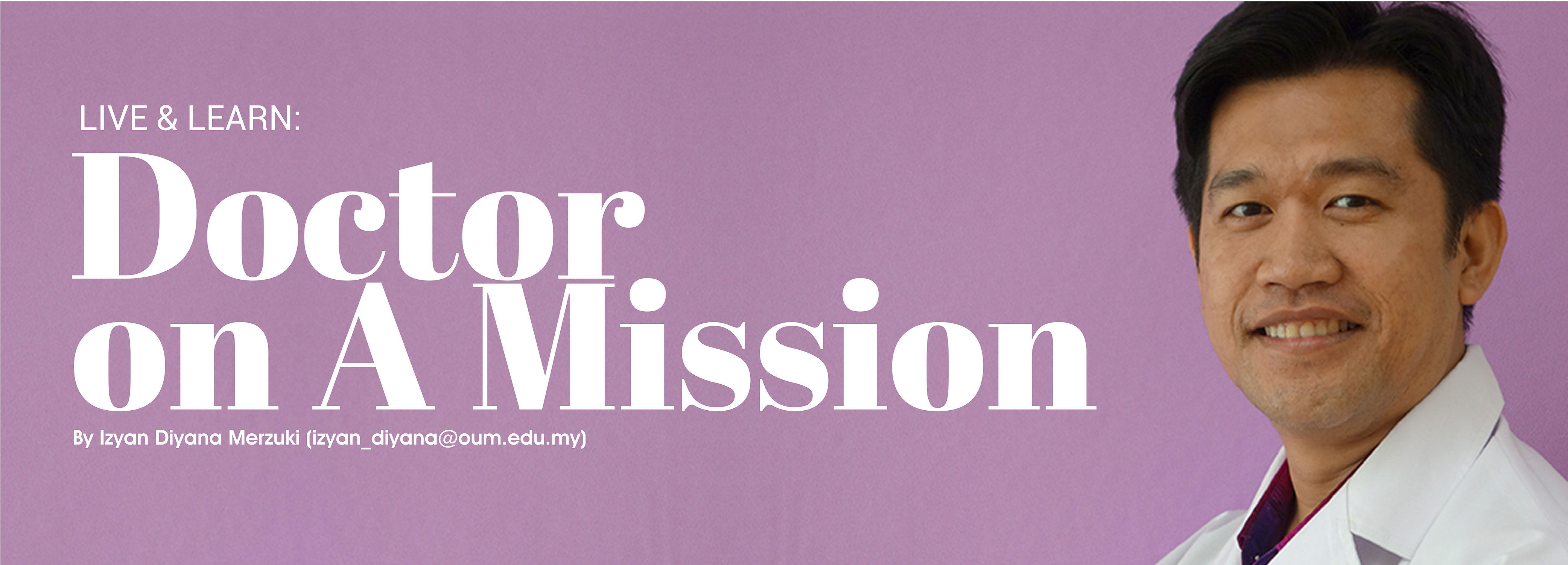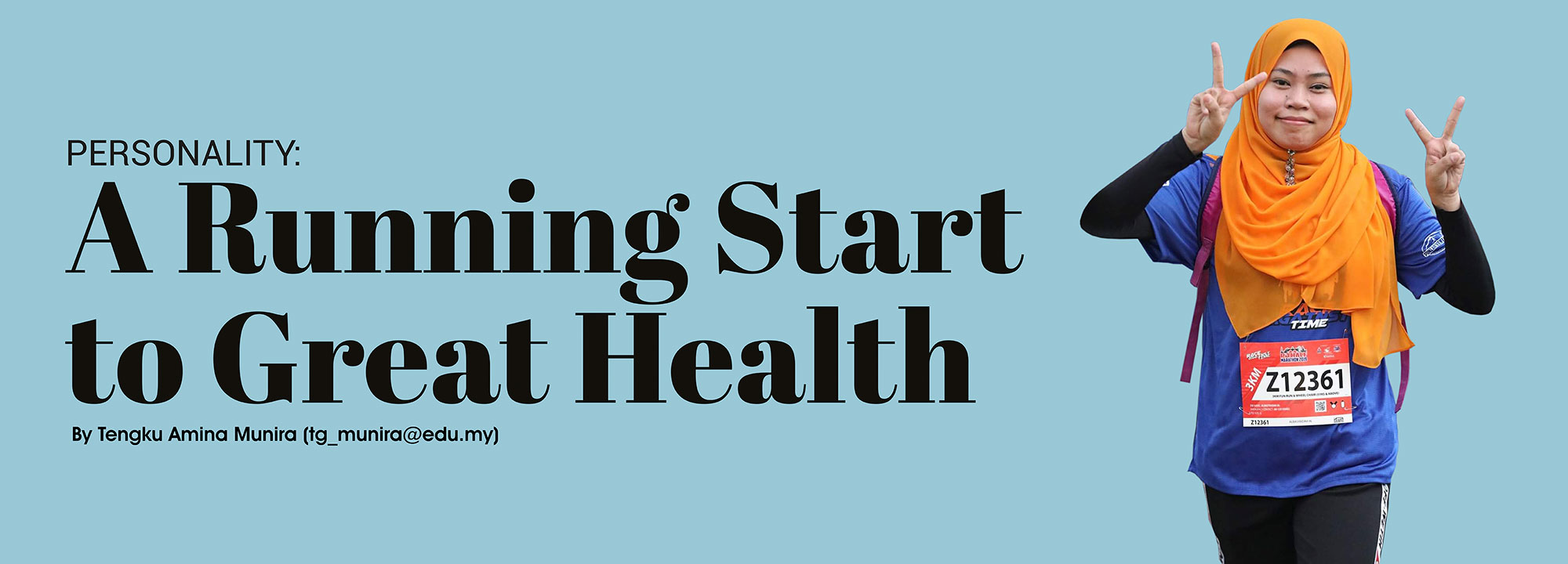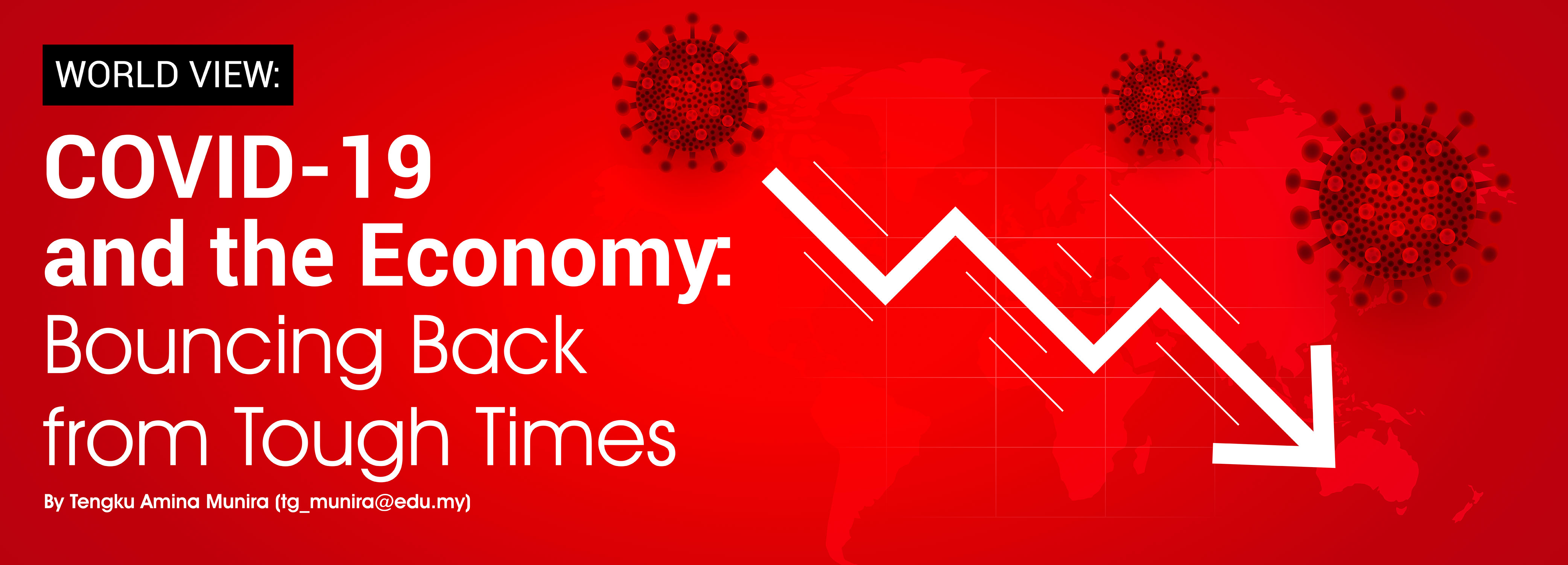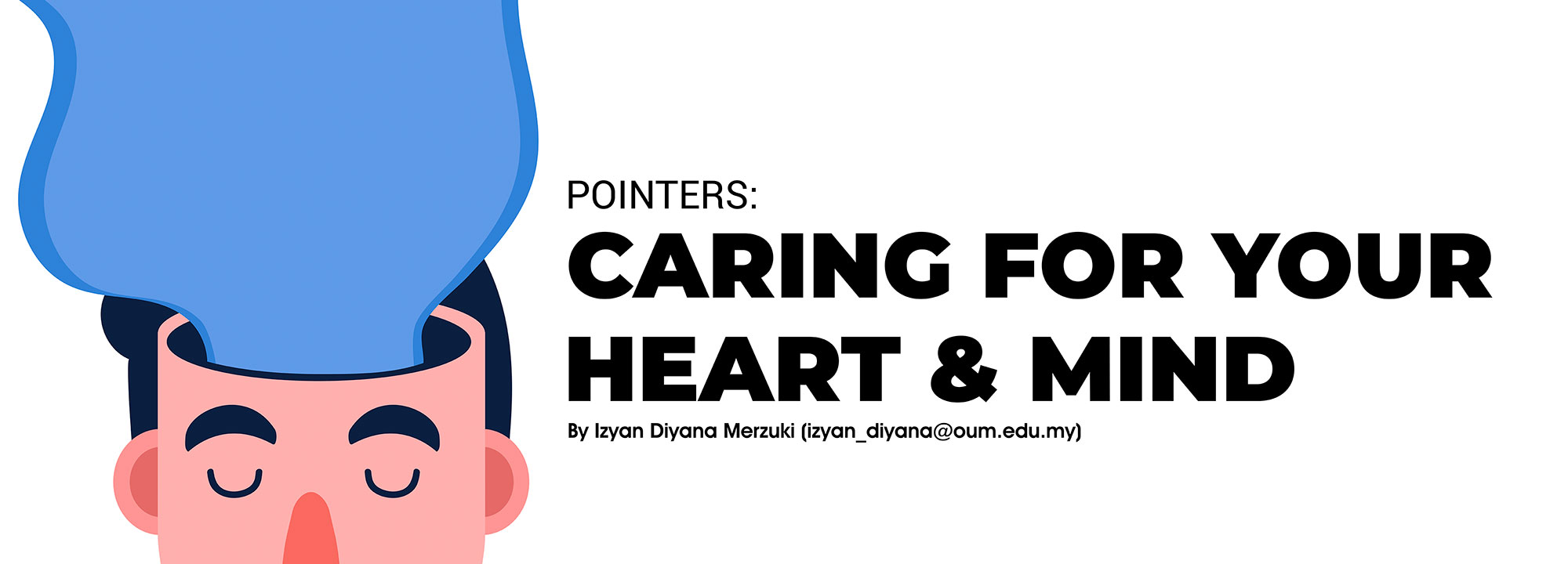
“Thank you, Doctor.”
These three words uttered with a sincere smile are enough to motivate Dr Mohd Khairol Jambli, 45, to keep giving back to his community.
Dr Khairol says he enjoy helping people as they never forget to thank him after receiving treatment or donations: “Their warmth always touches my heart and this has inspired me to dedicate myself towards helping others.”
The Sarawakian doctor received his Bachelor of Medicine, Bachelor of Surgery (MB BCh) from Cairo University, Egypt, and Occupational Health Doctor and Safety and Health Officer credentials from Malaysia’s National Institute of Occupational Safety and Health.
A true lifelong learner, he even added the Bachelor of Islamic Studies degree to his impressive list of credentials, graduating in 2016. The OUM alumnus is currently working as a medical officer as well as occupational safety and health officer at a local university in Sarawak.
Being a doctor keeps him busy but that does not deter him from contributing his efforts in community service activities such as outreach programmes in rural and remote areas in Sarawak, donating basic necessities to the needy and “Sunathon” or circumcision programmes.
“My involvement in community service started way back in 2009 when I was roped in to organise a programme for Aman Palestine Sarawak. Later, I assisted Yayasan Ikhlas in its outreach programmes to provide underprivileged communities with medical care and other welfare needs. Since then, community work has become my calling,” says Dr Khairol.
The father of six is also the president for the Sarawak branch of Ikatan Muslimin Malaysia (ISMA), which focuses on helping the public understand Islam better.
Dr Khairol explains, “Through ISMA, I have had the opportunity to give inspirational and motivational Islamic talks to teenagers, youths and adults at mosques, camps, among others. I am now more confident at giving such talks to the community based on the Islamic knowledge that I gained from my studies.”
“The programme gave me valuable insights into Islamic knowledge through subjects like Usul Fiqh and Ulum Quran. The combination of both my medical and science backgrounds and Islamic studies has strengthened my faith in Islam,” he adds.
The Movement Control Order has somehow impacted his community work as all activities have to conform to the guidelines and new normal outlined by the Government to ensure the safety of everyone involved.
“I still share my knowledge but this time through my personal Facebook account or ISMA Kuching Facebook page because talks involving the gathering of large group of people are now prohibited.”
About his future plans, Dr Khairol is hoping to pursue a master’s degree in occupational safety and health risk management, possibly at OUM.
“I wish to be more involved in community work by providing medical care to the needy and sharing of knowledge with society. I believe the best among us is the one who is most helpful to others, just as the Prophet (PBUH) said, “The best among you are those who bring greatest benefits to others”.”

If you look for Albasyaidah Abdul Latif, known to her family and friends as Aalya, you will probably find her out on a run.
A few years ago, the Diploma in Human Resource Management graduate went to see the doctor with low blood pressure. She was advised to take up sports to keep active, so she started running. The rest, as they say, is history.
“My first-ever run was the Pink October Fun Run in October 2016,” Aalya explains. “It was just a five-kilometre run but I was hooked!”
Since then, the 38-year-old has participated in about 70 runs, including Malaysia Women Marathon, Twincity Marathon, Selangor Marathon, Langkawi Ultra, and also others like FITMalaysia and Batik Run. One of her favourites is the annual Standard Chartered Marathon, which she has never missed since she picked up the hobby.
Aalya shares, “My inspiration is Tok Adi, a legend in the local marathon circuit. He is in his late 40s but has amazing spirit and stamina. He started with five-kilometre runs but has upgraded to 75-kilometre ultra runs.”
Hailing from Jelebu, Negeri Sembilan, this executive assistant at a local insurance company has taken this passion farther and farther, starting from just three kilometres to now, 21 kilometres.
“I cannot call myself a marathoner yet,” she says humbly. “I only started the 21-kilometre run this year, thanks to the encouragement of my teammates. To be considered a marathoner, one must complete double that distance.”
Even those not familiar with running can imagine the dedication it takes. Aalya shares, “Running requires a lot of preparation and time management. It also takes sacrifice: some events flag off as early as 2am and it’s common for me to get up in the wee hours to make it to the starting point on time. Practice is also important; I usually train at the park near my house.”
Aalya graduated in 2013 and is most proud of her OUM modules: “Those were so special! They gave me the feeling of being a true learner. The content was rich and relevant to every course that even friends from other universities wanted to borrow my modules.”
Though running is not an easy hobby to take up, she believes anyone can do it: “Start slowly and you may be surprised by how you feel. After all, there are so many benefits to running, like improving your health, relieving stress, meeting new friends and seeing new places. A nice medal at the end of the day also gives you a wonderful feeling.”
But Aalya says there is one special bonus all Malaysian runners look forward to: the Milo truck at the end of the race.

Every Malaysian knows 2020 was meant to be our milestone year. No one imagined that just three months in, a viral outbreak would change everything we ever took for granted.
Currently still an active pandemic, the COVID-19 outbreak has left in its wake global repercussions yet to be fully understood. Lockdowns and restricted movements undertaken by the authorities to curb the spread of the virus have caused businesses and industries to come to a virtual standstill. Everyone - from large corporations to pasar malam vendors – are struggling to make ends meet.
The International Monetary Fund anticipates a global recession this year, potentially worse than the one in 2008. The World Bank has projected a 2.4% contraction in GDP. Imagining the worst-case scenario, Bloomberg says GDP growth might even be at 0% or in the negatives. Our own Prime Minister Tan Sri Muhyiddin Yassin revealed the country has lost RM2.4 billion a day since the introduction of the Movement Control Order (MCO) on 18 March.
Since the MCO was enforced, things are nowhere near back to normal. A total of 951,000 Malaysians are anticipated to lose their jobs while 40% of local small- and medium-sized enterprises might have to close shop if the situation persists beyond six months. Everything sounds bleak, so how can we bounce back?
Breaking the chain of infection remains a priority, but Malaysia must also begin implementing economic recovery strategies to rise above this enormous challenge.
According to Bachelor of Management programme director Dr Chiam Chooi Chea, a viable, feasible, well-rounded and well-executed economic plan will be crucial over the next few years.
“One of the most important things to consider is source of revenue. Malaysia must find ways to secure revenues externally rather than internally. Admittedly, this is going to be a challenging task as the problem is not just ours alone,” she explains.
The government is formulating a plan to help boost businesses, instil consumer confidence and empower a more positive investment environment. The plan will also link and complement various stimulus packages to get people and businesses back on track post COVID-19.
Many have turned to digital solutions to reshape businesses as consumer activities have shifted to online platforms and socialising via conferencing tools. While people are looking to the Internet to earn income, Dr Chiam says it is also important to seize the right opportunities.
“If you’re willing to take risks, look for ways to invest where the capital is lower in order to gain profit,” she says. “Local enterprises must quickly change their marketing strategies to reach their target audience and small businesses can innovate through online solutions. Additionally, strong support from the government and business associations is also crucial.”
But even though everyone is worried about their next pay cheque, Dr Chiam says we must remember that learning should never be overlooked.
“Of course, survival depends on fulfilling basic needs. But a forward-thinking individual would know that no matter the situation, gaining knowledge will lead to better opportunities in the future,” she concludes.

Goh Lay Khim has barely had a moment’s rest since she graduated as one of the top scorers in the Master of Nursing programme at the 22nd Convocation last year. The tutor at the Clinical Skills Centre of a local private university has been keeping busy with a growing career.
“I have little time to spare with my family nowadays,” Goh admits. “My work has picked up and I am discovering new interests related to my work, such as manuscript writing and conducting quantitative and experimental research.”
The 33-year-old has moved on from the hands-on side of nursing to its theoretical aspect. She worked as a staff nurse for five years, but now teaches basic nursing skills to medical, pharmaceutical, dental, and Chinese medical students. She also manages the Simulated Patient programme, which is a teaching approach that hires people to play the role of patients with various health-associated conditions.
“I’m also part of the team developing a virtual reality project,” she adds.
Goh takes a pragmatic approach to strike a balance between juggling the demands of her job with her role as wife and mother of a three-year-old daughter.
She shares, “If it’s a weekend or public holiday, I strictly focus only on my family. My husband, who is self-employed, is also very kind; he stays home to take care of my little girl if I have tasks to complete or meetings to attend.”
Goh was attached to the OUM Graduate Centre, previously in Kuala Lumpur, and remembers her student days fondly.
“I still miss the face-to-face tutorials as I learned a lot about how lecturers can teach, motivate and engage learners. I also still miss doing assignments as they motivated me to find ways to apply what I’ve learnt and improve my work.
“One of my most memorable moments was when my final research project was accepted for poster presentation at the International Medical Education Conference in Vienna, Austria last year. That was my first experience attending an international conference in a European country,” she shares.
Since the COVID-19 outbreak, Goh, like many Malaysians, has had to work from home. She reaches her students via online discussions and must now prepare for a new norm at the workplace.
Despite the challenges ahead, Goh feels that education remains a key aspect in self-discovery: “All it takes to learn is commitment and interest. After all, learning can happen anytime and anywhere. The coronavirus pandemic may have become our new reality, but lifelong learning should always be an important part of life.
Goh advises, “For those looking to study while you work, remember that you will need to dedicate time and effort. Have the right mind-set from the very beginning: don’t just study for a paper qualification but do it to improve yourself. And lastly, the convocation is not the end. After you graduate, you should still continue to learn new things.”

Are you feeling stressed, anxious or sad? You are not alone. Life has not been easy these days as we are isolated from friends and loved ones and must take on the new normal. Worse still, some may face the possibility of losing their jobs and income.
Some may be coping well with the situation, but others may find their emotional resilience slowly falling apart. You cannot control what you feel inside but you can control how you handle them. So take a moment to read a few basic tips to help you get through these tough times.
Acknowledge Your Feelings
During a crisis, it is normal to be sad, frustrated, restless, worried and more. All you have to do is acknowledge how you really feel. Take time to understand and decipher your own emotions. Once you discover your true internal feelings, allow yourself to face them and find effective ways to overcome them.
Talk About It
Once you have acknowledged your feelings, find a way to express them. Pent-up negative emotions are bad for your mind and body. Get them off your chest!
The best way is to talk about it with a trusted friend or family member. Call them and share your concerns, thoughts and feelings. Don’t just send texts or emails; talking can make a really big difference.
The golden rule here is: Don’t be afraid to reach out and get help if/when required.
Healthy Body = Healthy Mind
There’s a quote by Sir Richard Branson: “A healthy body equals a healthy mind, and a healthy mind takes care of business.” With a healthy body and mind, you are free to do anything and that will make you one happy human!
How do you achieve that? It comes down to basics. Drink plain water. Eat natural food. Think positive. Exercise regularly. Sleep well. This is called self-care. Love yourself by treating your body right. It will eventually ease your mind too.
Keep Yourself Occupied
Spare some time for relaxing activities and surround yourself with people you are comfortable with. If you feel restless at home, catch up on movies and TV shows, play games, spring-clean your house or learn new recipes. Find one or two things that you enjoy.
Set Limits
As advised by the World Health Organization, limit the time for checking media coverage, updates or news about the crisis. This may help ease your anxiety and distress. It is okay to take some time off and unplug from technology. Unwind by meditating, praying or listening to music instead.
Take A Break, Take It Easy
It’s all about mindfulness; live in the moment. Life is about simplicity. Don’t be too hard on yourself. Take a chill pill once in a while. Make a good cup of tea or coffee or any of your favourite beverages and sit down. Sip and savour the moment with just you and your hot drink while looking out the window and reflecting on the good things.
Here’s a reminder: Everyone is fighting a battle and you are not alone. Stay positive and embrace the glorious mess that you are.